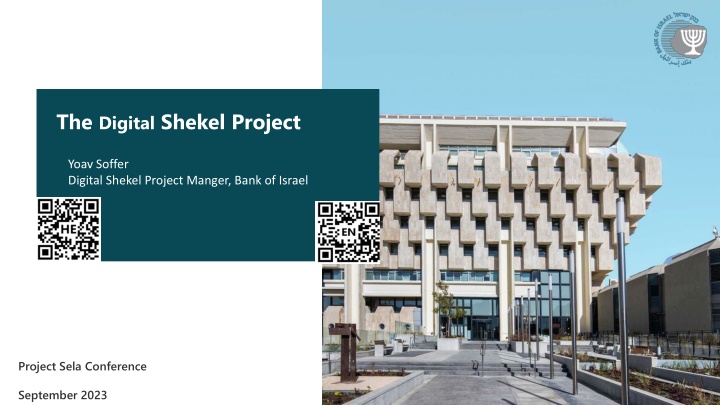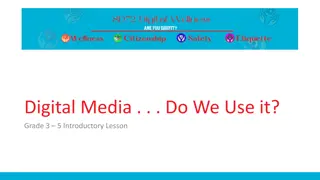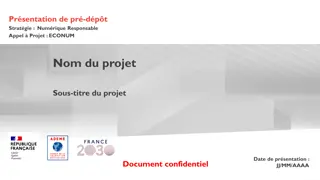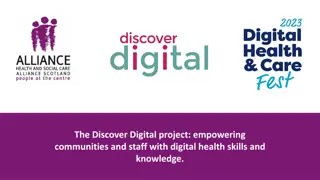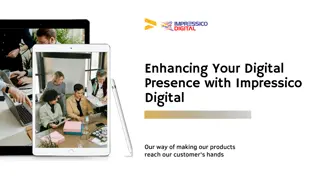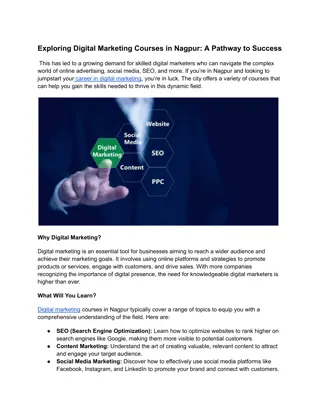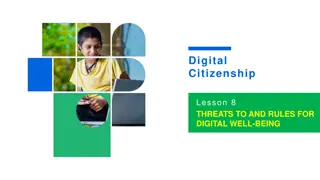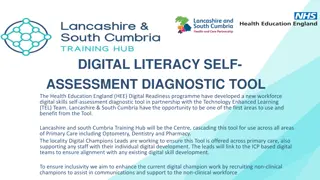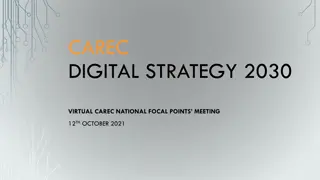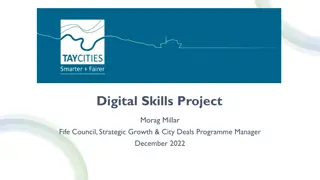The Digital Shekel Project Overview
The Digital Shekel Project, led by Yoav Soffer, Project Manager at the Bank of Israel, aims to explore the potential issuance of a digital shekel. The project timeline, motivations, possible scenarios for issuance, and key developments are outlined. The project's main objectives include enhancing payment systems, reducing cash usage, and promoting digital payments. Stay updated on this innovative initiative!
Download Presentation

Please find below an Image/Link to download the presentation.
The content on the website is provided AS IS for your information and personal use only. It may not be sold, licensed, or shared on other websites without obtaining consent from the author.If you encounter any issues during the download, it is possible that the publisher has removed the file from their server.
You are allowed to download the files provided on this website for personal or commercial use, subject to the condition that they are used lawfully. All files are the property of their respective owners.
The content on the website is provided AS IS for your information and personal use only. It may not be sold, licensed, or shared on other websites without obtaining consent from the author.
E N D
Presentation Transcript
The Digital Shekel Project Yoav Soffer Digital Shekel Project Manger, Bank of Israel Project Sela Conference September 2023
The Digital Shekel Project on the Timeline 2017 First interdepartmental team to study the topic. October 2018 - the team's recommended not to take any further actions, but to continue to monitor the topic; October 2020 - the team turned to the governor and recommended moving to a project phase, mainly against the background of global developments in the field; November 2020 - The digital shekel project was established as an action plan , under a steering committee of senior Bank members of management and headed by the Deputy Governor. May 2021 Steering Committee publishes Potential motivations, draft model, and issues to examine . Five other papers published since then, reflecting the project s economic analysis, technological explorations, and public consultations. Summer 2022 Together with BISIH, Launched Project Icebreaker (with Sveriges Riksbank and Norges Bank) and Project Sela (with HKMA). January 2023: The steering committee set a target to complete a design document by December 2024. The document will be the basis for a possible RFI and an implementation plan. 2
Motivations for a Possible Issuance of a Digital Shekel Redundancy of the payment system in view of emergencies or breakdowns Innovation and adaptation of the payment system to the needs of the digital economy Competitive alternative to the existing and new means of payment in the digital era Support government s policy to reduce the use of cash and the struggle the underground economy Efficient and inexpensive infrastructure for cross-border payments Paying digitally while maintaining a certain level of privacy 3
Scenarios For the Decision on the Issuance of the Digital Shekel The steering committee analyzed the conditions that will enable or support the decision to issue a digital shekel at some point, and highlighted a number of scenarios that could affect the bank's decision: Issuance of CBDC by other countries; A decrease in the legitimate use and acceptance of cash in transactions in Israel; Significant penetration of a stablecoin or other private means of payment which would be widely used; The extent of competition in the domestic payment system; Technological developments in the payments system. 4
The Design Process Completed items: Future items: AML requirements Interoperability Security requirements Inclusion and the role of Intermediaries Data design Performance requirements Offline Holding limits Consumer protection Cross border interoperability Programmability Acceptance Cost structure Privacy Scheme management End users Items near completion Access technology Items in process: Logical architecture Immediacy and finality 6
The Design Process Performance Requirements Cost Structure Security Requirements Data Design Interoperability Privacy Access Technology Programmability Holding Limits Cross border Interoperability Scheme management Offline Acceptance Consumer Protection Inclusion and the Role of Intermediaries End Users 7
Stakeholder Consultation Forums A design process cannot be successful and useful if it is not well informed or performed in isolation from the ecosystem. Therefore, we have launched three stakeholder consultation forums: Government entities and regulators; Think you belong in one of these forums? Representatives of potential end users; Contact adi.schwieg@boi.org.il Financial industry. Technological Forum may be added at a later stage
Design Decisions Made So Far
Scheme Management Principles Role of the BoI in the digital shekel scheme - The digital shekel will operate within a scheme, in which the BoI will be the owner that will set the scheme rules, the operator of the scheme (although it may extend this responsibility to an external vendor), and the system regulator; PSPs and Funding Institutions - Other than the BoI, the scheme would include PSPs - entities that provide digital shekel wallets and other services, and funding institutions (such as commercial banks and other deposit taking institutions). While a funding institution may also serve as a PSP, these are by essence different types of entities with different functionalities, requirement and obligations; Mandated funding and defunding to ensure interoperability - Funding institutions will be obliged to support their customers' request for funding and defunding. 10
Cost Structure BoI to bear its own cost - The digital shekel, as a natural evolution of cash in the digital economy, is a public good. As such, the BoI will bear its own costs, and will not charge users or participants for the investment or the ongoing costs of managing the system; Free basic services for individuals - Basic services in the digital shekel (onboarding, making and receiving payments, funding and defunding) will be free for individuals. PSPs may charge FREE fees from businesses for basic services, and from individuals for advanced services. Fees may be capped by legislation or regulation. Specialization and intermediary of last resort - PSPs would be allowed to specialize in serving specific market segments. Therefore, there would need to be a solution for end users if they are not being served by any PSP. 11
Acceptance Government payments - End users shall be able to pay and receive payments to/from government entities with the digital shekel; Advanced payments - The digital shekel shall support advanced payment types such as conditional payments and micropayments; Inclusion - Users who are digitally excluded will be able to access and use the digital shekel; Offline - The digital shekel shall support offline payments. Appropriate risk mitigation measures will be in place; Legal tender - The digital shekel will be legal tender in Israel, just like cash; 12
Privacy Level of Privacy between that of cash and private sector money - Transactions will not DS all be completely anonymous, but intermediaries will have less data, or less permission to use it, than they have with private money; Monetization of data. Intermediaries will not be permitted to monetize any identity or transactional data unless the end user grants clear consent. No BoI access to identifiable data - The BoI, or any other public authority, will not have access to individual identifiable transaction data or balance data. At most, the same level of access to PII will be given to enforcement authorities as with existing payment systems, and only via the PSPs. 13
End-Users Participation Digital shekel for all Israeli residents (individuals and organizations) - Subject to KYC procedure, any * legal Israeli resident, (regardless of nationality), and any Israeli business or organization, shall be entitled to access the digital shekel; Digital shekel use by minors - The age for a minor to have his/her own wallet will be lower or equal to the age at which a minor can open a bank account. A minor at any age shall be allowed to use the digital shekel using a sub-wallet linked to his guardians' wallet, given guardian consent; Digital shekel use by foreigners - Foreign entities shall be permitted (but not entitled) to access the DS system, provided that a licensed PSP has consented to conduct KYC, onboard and provide them with services. Tourists visiting Israel shall be able to access the digital shekel according to terms and conditions to be defined in the context of their stay. 14 *Icon designed by Octopocto from www.flaticon.com
The Legal Aspect As part of the preparation, the legal department of the Bank of Israel conducted a preliminary review of legislative measures that will be required for issuance of a digital shekel. Three main areas will need to be considered: 1. The legal basis for the issuance of a digital shekel by the Bank of Israel; 2. The legal implications of various characteristics of the digital shekel; 3. Applying existing legislation to the issuance of the digital shekel. At this stage there is no intention to initiate a legislative process. 15
